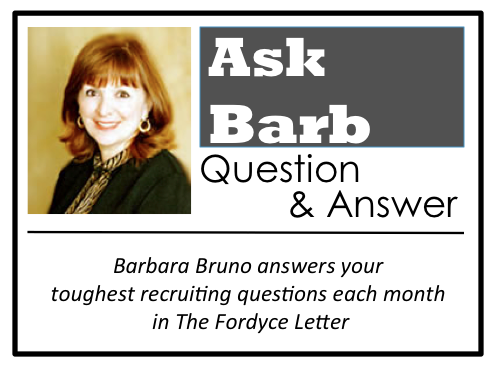Dear Barb:
In the past 30 days I’ve had three offers turned down and they all came down to money. I heard you teach a process that I think you called, “Close To The No Money” at a NAPS conference years ago and can’t remember how to do it. Can you enlighten me again? I have another deal going south right now and this is costing me a fortune!
Marcie D.
St. Louis, MO
Here’s How It’s Done
Dear Marcie:
The process I teach is called “Close To The No On Money.” Often candidates say it’s not about the money, but money always plays a part in their decision.
The greatest mistake most recruiters make is quoting the top of a salary level in order to entice a candidate’s interest in the position you are representing. The problem is that a candidate could be earning $65,000; when you give them a range of $70,000 – $85,000, they only hear $85,000.
When you are asked what a position will pay, your answer should be, “I don’t know. It depends on how well you interview.” Then ask, “What is your current compensation package?” Remember to include bonuses, 401K contributions by the employer, cost of benefits, and anything else that would be considered. Once you know their current package, and it is within the range of your client, you should say,
Your compensation package is definitely within the range that my client will pay.
It does depend on how well you interview. If my client feels you will hit the ground running with little or no training, dollars can go up. I also want to ensure you that the more money I get you, the more money I earn. I have a vested interest in getting you the best offer possible, and never leave money on the table when I’m negotiating an offer for you.”
Let’s talk about salary. I see your current salary is $65,000, is that correct? Let’s assume my client can offer you everything else you are looking for, what is that dollar amount?
They might say, “I understand the position you have goes up to $85,000 so that is my bottom dollar.”
You need to explain that they should possibly consider the top of the range for:
- Extensive experience
- Someone from a competitor.
Then, start to close them to the no on money:
If I have an opportunity that addresses everything you told me that was important to you and the salary is $75,000, should I pick up the phone? What about $70,000? What about $68,000? What about $65,000?
I’m going to keep asking this question until the candidate says, “No, I will not accept anything less than $68,000.”
Then, reduce the dollar amount by $500:
If I have an awesome opportunity that pays $67,500 and can offer you everything else you told me was important to you, should I call you?
Once the person says no, you should put that figure on your application/profile form and circle it.
You should verify that number several times:
- When you present opportunities to this candidate;
- When you prep your candidate for an interview;
- When you debrief your candidate after an interview;
- When you are ready to extend an offer.
The number tends to increase as the process continues. If your client calls and extends an offer of $75,000 and you have your candidate closed to the no on money at $70,000, you need to make one more important phone call to close the candidate on money.
The reason for this is simple. You don’t know who your candidate has talked to in the last 24 hours that may have impacted their decision.
The final call is as follows:
My client is getting close to a decision between you and another candidate. I want to make sure I understand what offer you will accept. If I get an offer at $70,000 with a two week start date, do I have your authority to accept this offer on your behalf?
Then, call your candidate back. Extend the offer which they are anticipating, $70,000 – $72,000. Next, congratulate them and tell them you were able to get them a raise upfront. When you extend an offer of $75,000, this is an offer that is accepted.
Your goal is to always close your candidates lower and your clients higher so you have room to negotiate when the offer is extended. When dollars come in higher than anticipated, counteroffers lose their impact. Closing to the “no” will close more deals and make you more money.
Barbara J. Bruno, CPC, CTS
